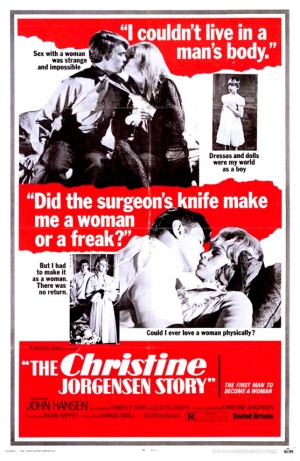
THE CHRISTINE JORGENSEN STORY
US, 1970, 98 minutes, Colour.
John Hansen, Joan Tompkins.
Directed by Irving Rapper.
The Christine Jorgensen story tells the story of American man George Jorgenson, his realisation that he had a feminine consciousness in a masculine body, his visit to Denmark and the success of the first sex-change operation. It highlights, with some sensitivity, his persecution when a child, the misunderstandings of his family, his period in the army, people's wariness of him, his career as a photographer - and the approach of the homosexual. It also focuses on a sympathetic aunt, the medical background to his condition, the success of the first operation. Again, it highlights the cynical reaction in the United States, the reactions of the media and the film ends with a final vindication of the sex-change operation when performed in the '60s in the United States.
The film is old-fashioned in style, is presented with the treatment expected of glossy magazine articles. John Hansen, an inexperienced actor, does his best with the double role. Direction is by veteran Irving Rapper, director of such films as Now Voyager, The Voice of the Turtle, The Miracle.
The film was produced at the end of the '60s, indicating a greater openness in the themes for American films. A comparison at this time would be the Anne Heywood vehicle about the same topic, I Want What I Want. There was also some satirical presentation of the theme in the film version of Gore Vidal's Myra Breckenridge.
1. The theme of the film? Interest? Curiosity?, Straightforward treatment? Prurient or not?
2. The old style film treatment? Sentiment? Appeal?
3. The touches of the sensational? Message? Biography? Problem? Flashbacks?
4. The atmosphere of the United States? The American family? Family life? The world of the photographer? Of medicine? Psychology? The atmosphere of Denmark? Family, medical? The colour photography, the effects for the operation? For George/Christine's consciousness? Musical score?
5. The title and the focus on Christine? The historical basis? The biography? Her memoirs?
6. George's childhood? The credits and the doll? The episodes indicating George's feminine consciousness: dolls, with the girls, his not liking sport and its roughness? The ridicule of the children - Georgette? The defence of his sister? His father's expectations, boys' toys? The flashbacks with his dressing in -girls' clothes, the make-up? The parents and their understanding of their child? The father's not wanting to understand? The transition to George's growing up? His primness, sheltered life? His experience as a photographer, his enthusiasm, his feminine sensibility with arranging the models? Their bitchiness to him? The advances by his producer? His shock, running away, contemplating suicide? The friendly support of the model? The flashbacks about his army life, the training, his survival? The visit to the brothel? The shower sequence? Doubts about his sexuality? The ridicule of the prostitute? His wanting these episodes to be included in the biography? His reading about gender? Approaching the doctor, the blood tests, the discussions?
7. The possibility of going to Denmark? His not telling his parents? The present of the camera? The arrival in Denmark, his aunt and her secret about her daughter Christine, her support of him? Meeting the doctor, the preparation for the operation - the seriousness of the situation, physical and psychological change, the explanations? His signing the document? The operation - and the nightmares of his contemplated suicide? His recovery, the changing feminine characteristics, the hospital observations? His getting new c7othes? His becoming Christine and choosing the name of his cousin? George becoming Christine and a woman, her feminine sensibility, manner, style? Tom and his arrival to write the book? Hostility towards the manner and their ridicule? Confidence in Tom, confiding in him, her sensitivity as regards the photo and his touching her? The love for Tom? The decision to return to America? Being received happily by her parents?
8. The sketch of the parents, ordinary Americans, achievement, not understanding their son? The news of the sex-change, the father's embarrassment, the media? The mother's concern? The daughter's support? (And the background of the wedding, George's photographing it, the aftermath and his torment?)
9. Aunt Thora and her sympathy, understanding, her own secret?
10. Tom and his arrival, writing, friendship with Christine, separation, leave, bringing her back to America?
11. The sketch of the doctors, their research? The risks? The Danish situation? The contrast with the United States? The first operation in the United States vindicating the pioneers?
12. The portrait of the media: television ridicule, the headlines, the reporters hounding the family and Christine? The final emotional sequences - and the appeal for sympathy and understanding from the audience?
13. A popular presentation of questions about sexual identity, physical and psychological sexuality, emotional sexuality, the masculine and the feminine, American society, stereotypes and bigotry?